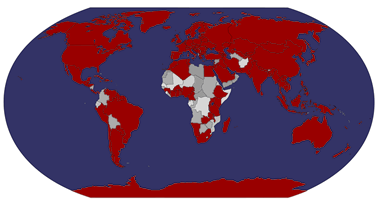A new country to my collection! Well, this one wasn't actually mailed from Angola but since the chances of ever receiving a postcard from there are pretty slim, I'm more than happy with this one. It's such a nice view, too!
Angola, officially the Republic of Angola, is a country in Southern Africa. It is the seventh largest country in Africa, and is bordered by Namibia on the south, the Democratic Republic of the Congo on the north, and Zambia on the east; its west coast is on the Atlantic Ocean and Luanda is its capital city. The exclave province of Cabinda has borders with the Republic of the Congo and the Democratic Republic of the Congo.
The Portuguese were present in some – mostly coastal – points of the territory of what is now Angola, from the 16th to the 19th century, interacting in diverse ways with the peoples who lived there. In the 19th century, they slowly and hesitantly began to establish themselves in the interior. Angola as a Portuguese colony encompassing the present territory was not established before the end of the 19th century, and "effective occupation", as required by the Berlin Conference (1884) was achieved only by the 1920s after the Mbunda resistance and abduction of their King, Mwene Mbandu I Lyondthzi Kapova. Independence was achieved in 1975, after a protracted liberation war. After independence, Angola was the scene of an intense civil war from 1975 to 2002. Despite the civil war, areas such as Baixa de Cassanje continue a lineage of kings which have included the former King Kambamba Kulaxingo and current King Dianhenga Aspirante Mjinji Kulaxingo.
The country has vast mineral and petroleum reserves, and its economy has on average grown at a double-digit pace since the 1990s, especially since the end of the civil war. In spite of this, standards of living remain low for the majority of the population, and life expectancy and infant mortality rates in Angola are among the worst in the world. Angola is considered to be economically disparate, with the majority of the nation's wealth concentrated in a disproportionately small sector of the population.
Angola is a member state of the United Nations, OPEC, African Union, the Community of Portuguese Language Countries, the Latin Union and the Southern African Development Community.
Huíla, then, is a province of Angola. It has an area of 79,023 square kilometres and a population of 2,354,398 (2014 census). Lubango is the capital of the province. Basket-making is a significant industry in the province; many make baskets out of reeds.
Subscribe to:
Post Comments (Atom)





 Maroon
Maroon 










































































































































































No comments:
Post a Comment